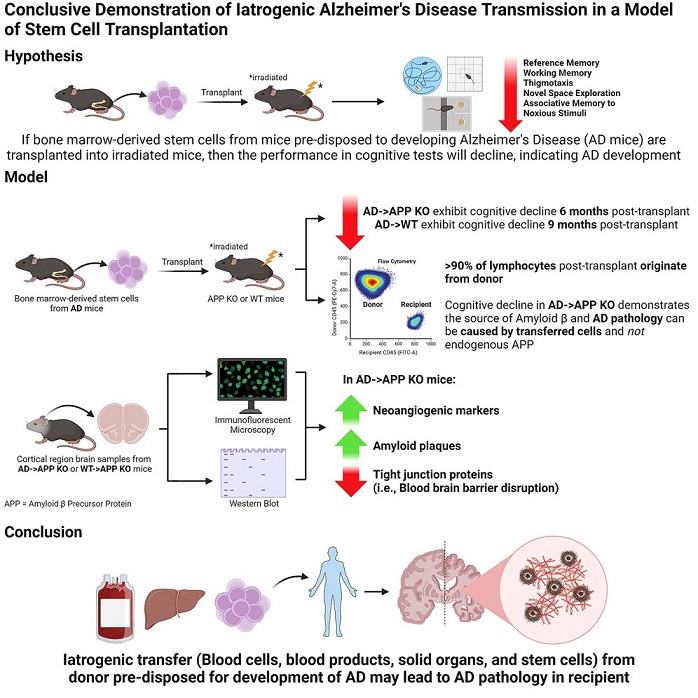BREAKING! Canadian Study Finds That Stem Cells, Blood Transfusions And Tissue Transplants Can Transmit Alzheimer’s Disease!
Nikhil Prasad Fact checked by:Thailand Medical News Team Mar 31, 2024 1 year, 10 months, 2 weeks, 6 days, 13 hours, 37 minutes ago
Medical News: Alzheimer's disease (AD) remains one of the most daunting challenges in modern healthcare, affecting millions of individuals globally and presenting a significant burden on healthcare systems and families. While extensive research has been dedicated to understanding the pathophysiology and potential treatments for AD, recent groundbreaking findings covered in this
Medical News report based from a Canadian study have brought to light a previously overlooked aspect of the disease - its potential transmission through medical procedures involving stem cells, blood transfusions, and tissue transplants.
 Graphical Abstract: Stem Cells, Blood Transfusions And Tissue Transplants Can Transmit Alzheimer’s Disease
The Study's Genesis: A Paradigm Shift in Alzheimer's Research
Graphical Abstract: Stem Cells, Blood Transfusions And Tissue Transplants Can Transmit Alzheimer’s Disease
The Study's Genesis: A Paradigm Shift in Alzheimer's Research
Led by scientists at the University of British Columbia, the study represents a paradigm shift in our understanding of Alzheimer's disease (AD). The research focused on investigating the transmission of AD using a preclinical model involving mice genetically engineered to carry a human inheritable form of the disease.
The crux of the study lay in the transfer of biological matter, specifically stem cells extracted from the bone marrow of AD-afflicted mice, into healthy counterparts that did not carry the (Alzheimer's disease) AD gene. Over a relatively short span of nine months, the researchers observed a startling progression of AD pathology in the previously healthy mice, marked by cognitive decline and the characteristic accumulation of amyloid plaques in their brains.
These findings challenged the prevailing belief that Alzheimer's disease (AD) primarily originates from brain-derived amyloid and instead pointed to an alternative pathway where amyloid produced outside the brain, such as in bone marrow stem cells, could contribute significantly to the development of AD pathology.
Unveiling the Iatrogenic Risks: Implications for Medical Procedures
The term "iatrogenic" refers to conditions inadvertently caused by medical treatment or procedures. The study's revelations regarding the potential transmission of AD through stem cell transplantation, blood transfusions, and tissue transplants have profound implications for medical practice and patient safety.
The findings underscore the critical importance of enhanced screening and rigorous protocols in donor selection for medical procedures involving biological material transfer. Screening for deleterious disease-associated alleles and genomic sequencing of donors can significantly mitigate the risk of inadvertently transferring Alzheimer's disease (AD) and other diseases.
Moreover, the study sheds light on the broader neurological risks associated with transplantation procedures. While the focus was on Alzheimer's disease (AD) transmission, the insights gained contribute to a growing body of knowledge about neurological complications in transplant recipients. Unders
tanding these risks is paramount in developing strategies to improve patient outcomes and ensure the safety of medical interventions.
Dr Wilfred Jefferies, an immunologist at the University of British Columbia and principle author told the media, “Alzheimer's could be passed to healthy people through the donation of biological matter. This would mean that potential donors would have to be screened for the condition. The study findings also support the idea that Alzheimer's is a systemic disease where amyloids that are expressed outside of the brain contribute to central nervous system pathology. As we continue to explore this mechanism, Alzheimer’s disease may be the tip of the iceberg and we need to have far better controls and screening of the donors used in blood, organ and tissue transplants as well as in the transfers of human derived stem cells or blood products."
Translating Preclinical Insights into Clinical Practice
While the study was conducted in a preclinical mouse model, its findings have direct implications for clinical practice. The identification of a transplantable form of Alzheimer's disease (AD) emphasizes the need for ongoing research involving human subjects to validate these findings in real-world scenarios.
Moreover, the study opens avenues for the development of new biomarkers for AD and other neurological disorders. By understanding the role of peripheral amyloid in disease pathogenesis, researchers can explore novel diagnostic tools and therapeutic targets that may revolutionize the management of Alzheimer's disease (AD) in the future.
Addressing Limitations and Charting Future Directions
It is crucial to acknowledge the limitations of the study and chart future research directions to build upon these groundbreaking findings:
-Model Specificity: While the preclinical model provided invaluable insights, further research involving human subjects is essential to validate the applicability of these findings to clinical settings. Variations in immune response and genetic factors between species must be considered.
-Disease Variability: The study focused on a familial form of AD, which represents a minority of cases. Future research should explore the transmission risks associated with sporadic forms of Alzheimer's disease (AD), which are more prevalent in clinical practice.
-Broader Neurological Risks: The study's findings extend beyond AD and highlight the broader neurological risks in transplant recipients. Continued research into these risks can inform comprehensive strategies to enhance patient safety in medical procedures involving biological material transfer.
Conclusion: Advancing Safety and Understanding in Alzheimer's Research
The Canadian study's groundbreaking findings have significantly advanced our understanding of Alzheimer's disease (AD) transmission and iatrogenic risks in medical procedures. By unraveling the intricacies of how AD can be transmitted through stem cells, blood transfusions, and tissue transplants, researchers and healthcare professionals are better equipped to implement stringent safety protocols and enhance patient care.
As we continue to delve deeper into the complexities of AD and related neurological disorders, integrating these findings into clinical practice will be pivotal. Collaborative efforts between researchers, clinicians, and policymakers will drive innovation, improve patient outcomes, and ultimately bring us closer to effective treatments and preventive measures for Alzheimer's disease.
The study findings were published in the peer reviewed journal: Stem Cell Reports.
https://www.cell.com/stem-cell-reports/fulltext/S2213-6711(24)00049-3
For the latest on Alzheimer’s Disease, keep on logging to Thailand
Medical News.
Read Also:
https://www.thailandmedical.news/news/breaking-japanese-researchers-warn-about-risks-associated-with-blood-transfusions-from-covid-19-mrna-vaccinated-individuals
